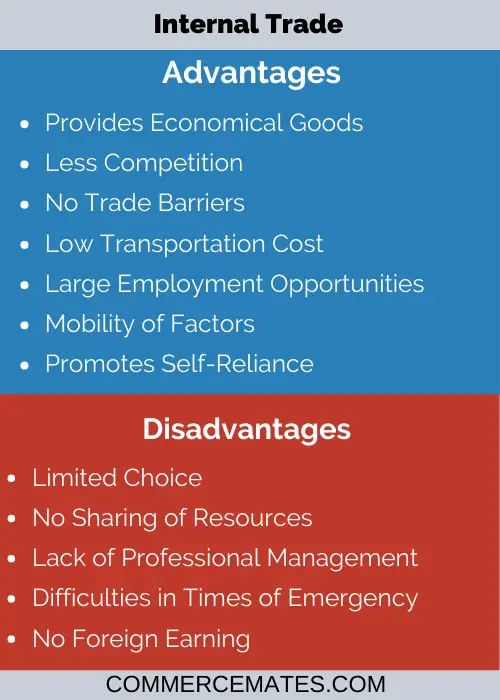Contents
Meaning of Internal Trade
Internal trade refers to the trade that takes place within the geographical boundaries of a countries. It involves buying and selling of goods or services within the same country and not outside the country.
Internal trade is also termed as Domestic trade or Home trade. In internal trade, buying and selling transactions are done in between buyers and sellers of same locality, town, village, cities or from different states but within the same country. All payments are processed only in currency of home country. Internal trade is of 2 types: Wholesale trade and Retail trade. Whole trade involves buying goods in bulk form producer and selling them in smaller quantities to intermediaries. Whereas, Retail trade involves distributing goods directly to consumers in small quantities.
Advantages of Internal Trade
- Provides Economical Goods: Internal trade provides goods at cheaper cost to peoples within the country. Goods produced domestically are free from any exchange duties and several taxes which bring down its overall cost.
- Less Competition: It restrict the entry of any foreign player in domestic market. Market competition exists only in between the local brands of country thereby prevents the exploitation of domestic firms by foreign firms.
- No Trade Barriers: Internal trade are bound to follow very few formalities as compared to foreign trade and is free from trade barriers. There is no restriction imposed and trade can be conducted freely in any part within the country.
- Low Transportation Cost: Trade taking place within the country involves low expenses on transportation facilities. Goods moves at a shorter distance within the country only which reduces the transportation risk and overall cost.
- Large Employment Opportunities: Internal trade generates a large no. of employment opportunities within the country. There are large peoples associated in various activities of firms operating internally. With the rise in number of domestic firms, need for manpower also rises thereby creating new employment opportunities.
- Mobility of Factors: It enjoys the advantage of mobility of factors of production. All factors like land, labor and capital can be easily moved around within the country unlike foreign trade that faces several restrictions.
- Promotes Self-Reliance: Internal trade promotes a sense of self-reliance and self-sufficiency within the country. When a nation is producing everything for fulfilling its needs internally, it does not need to depend on other nations for meeting its needs that makes it an independent economy.

Disadvantages of Internal Trade
- Limited Choice: Major drawback with internal trade is the availability of limited products manufactures domestically. It restricts the entry of variety of advanced imported products due to which consumer is left with limited options available.
- No Sharing of Resources: Countries relying on internal trade lack the chance of sharing resources from foreign countries. Any scarcity of resources can be easily meet by importing such resources from foreign land in case of foreign trade, but this is not possible in case of internal trade.
- Lack of Professional Management: Domestic firms operating within the country may lack professional management due to shortage of funds or unavailability of competent workforce. Skilled and qualified workforce can be easily acquired in foreign trade whereas internal trade faces restriction on such movement of labor internationally.
- Difficulties in Times of Emergency: Countries which practice internal trade faces difficulties in times of emergencies like famine, flood, war and scarcity. They face difficulty in supply of essential items like food, medicine and clothes from abroad due to restrictions imposed by them on international movement of goods.
- No Foreign Earning: Internal trade do not provide any source of foreign currency earning to the nation. All transactions in between the buyers and sellers are settled in domestic currency only.